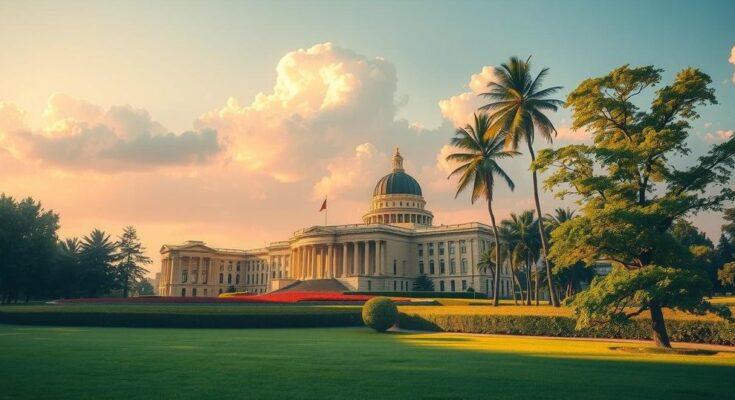Daniel Chapo was sworn in as Mozambique’s president amidst civil unrest following disputed elections. His inauguration is overshadowed by accusations of electoral fraud from opposition leader Venancio Mondlane, who threatens ongoing protests. Despite international criticism of the elections, Chapo pledges to uphold national unity and democracy, while the political situation remains volatile.
Daniel Chapo was inaugurated as Mozambique’s new president on January 15, amid heightened security in Maputo following violent protests over contested election results. Chapo, affiliated with the Frelimo party, is continuing its 50-year dominance despite opposition claims of election fraud, which an NGO suggests led to over 300 fatalities. In his inaugural speech, Chapo committed to fostering national unity, democracy, and the welfare of the Mozambican people.
Before the inauguration, opposition leader Venancio Mondlane threatened to disrupt Chapo’s administration with continuous protests, alleging that the October elections were unfairly executed. Mondlane contended that the elections favored the ruling party and announced his intent to paralyze governmental operations if necessary to institute change. He stated, “This regime does not want peace.” Mondlane, who recently returned after his lawyer’s assassination, signaled his willingness to engage in dialogues regarding the political situation.
International observers criticized the elections for being marred by irregularities, with the European Union condemning the unsubstantiated changes in election results. Security was tight during the inauguration; streets were blocked, and many businesses closed in protest or fear of violence. Unrest in the wake of the elections has resulted in numerous fatalities, including among security personnel.
As Chapo prepares to unveil his new cabinet, there are speculations that he may consider potential concessions to the opposition, facilitating dialogue despite Mondlane’s recent exclusion from discussions. Official results indicate Chapo secured 65% of the vote, overshadowing Mondlane’s claimed 53%. The political landscape remains heavily skewed in favor of Frelimo, which commands a significant majority in the national assembly.
The political context in Mozambique is characterized by longstanding tensions between the ruling Frelimo party and opposition groups, particularly following contested elections. The recent presidential election on October 9 sparked widespread allegations of fraud, leading to significant unrest and violence across the country. With Chapo’s presidency commencing amidst these challenges, the nation faces a critical juncture in its pursuit of stability and democratic governance, particularly with Mondlane’s rise as a prominent opposing voice advocating for accountability and reform.
In summary, the inauguration of Daniel Chapo as Mozambique’s president occurs in a climate of civil unrest and accusations of electoral manipulation. Chapo, while promising to uphold democratic principles, faces significant opposition from Mondlane, who rallies for protests against the ruling regime. As Mozambique navigates through this political turmoil, the future stability of the nation relies on potential dialogues and reforms to address these critical grievances.
Original Source: www.lemonde.fr




